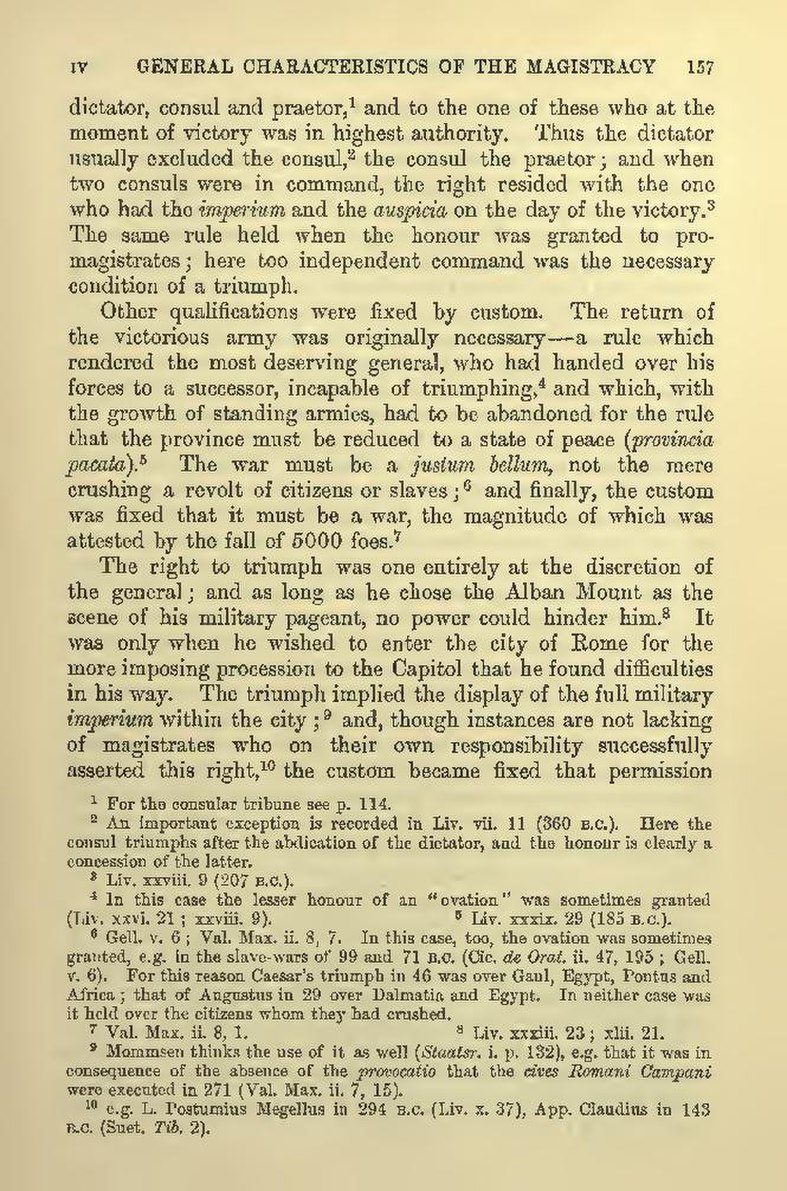dictator, consul and praetor,[1] and to the one of these who at the moment of victory was in highest authority. Thus the dictator usually excluded the consul,[2] the consul the praetor; and when two consuls were in command, the right resided with the one who had the imperium and the auspicia on the day of the victory.[3] The same rule held when the honour was granted to pro-magistrates; here too independent command was the necessary condition of a triumph.
Other qualifications were fixed by custom. The return of the victorious army was originally necessary—a rule which rendered the most deserving general, who had handed over his forces to a successor, incapable of triumphing,[4] and which, with the growth of standing armies, had to be abandoned for the rule that the province must be reduced to a state of peace (provincia pacata).[5] The war must be a justum bellum, not the mere crushing a revolt of citizens or slaves;[6] and finally, the custom was fixed that it must be a war, the magnitude of which was attested by the fall of 5000 foes.[7]
The right to triumph was one entirely at the discretion of the general; and as long as he chose the Alban Mount as the scene of his military pageant, no power could hinder him.[8] It was only when he wished to enter the city of Rome for the more imposing procession to the Capitol that he found difficulties in his way. The triumph implied the display of the full military imperium within the city;[9] and, though instances are not lacking of magistrates who on their own responsibility successfully asserted this right,[10] the custom became fixed that permission
- ↑ For the consular tribune see p. 114.
- ↑ An important exception is recorded in Liv. vii. 11 (360 B.C.). Here the consul triumphs after the abdication of the dictator, and the honour is clearly a concession of the latter.
- ↑ Liv. xxviii. 9 (207 B.C.).
- ↑ In this case the lesser honour of an "ovation" was sometimes granted (Liv. xxvi. 21; xxviii. 9).
- ↑ Liv. xxxix. 29 (185 B.C.).
- ↑ Gell. v. 6; Val. Max. ii. 8, 7. In this case, too, the ovation was sometimes granted, e.g. in the slave-wars of 99 and 71 B.C. (Cic. de Orat. ii. 47, 195; Gell. v. 6). For this reason Caesar's triumph in 46 was over Gaul, Egypt, Pontus and Africa; that of Augustus in 29 over Dalmatia and Egypt. In neither case was it held over the citizens whom they had crushed.
- ↑ Val. Max. ii. 8, 1.
- ↑ Liv. xxxiii. 23; xlii. 21.
- ↑ Mommsen thinks the use of it as well (Staatsr. i p. 132), e.g. that it was in consequence of the absence of the provocatio that the cives Romani Campani were executed in 271 (Val. Max. ii. 7, 15).
